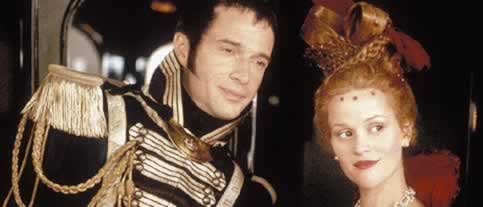


![]()
VANITY FAIR ![]()
Starring:
Reese Witherspoon, Gabriel Bryne, Bob Hoskins, Rhys Ifans, James Purefoy,
Romola Garai, Jonathan Rhys-Meyers and Jim Broadbent
Director:
Mira Nair
Running Time:
137 mins
Out to buy on DVD 16/05/05
"Bring in my bags and where is Lord Pitt?"
Becky Sharp to Lord Pitt
Growing up as an orphan in Georgian London, Becky Sharp knew that she was destined for greater things and it was up to her to achieve this. Starting out as a Governess in the Pitt household, Becky soon put her foot on the first step of the social ladder when she became involved with Lord Pitt Crawley's (Hoskins) son Rawdon (Purefoy). The problem was that she now had to endear herself to the other women of society and not just been though of a social climber.

![]()
William Makepeace Thackery's classic novel comes to the big screen but can Hollywood darling Reese Witherspoon become one of the great female literacy characters?
Even though it was set in the early 1800s, Vanity Fair has always been seen as a quite modern tale. Becky Sharp raise through the social echelons of British society can be paralleled to many a film or pop star today. She is a woman taking charge of her own destiny and playing the right cards to get were she wants. This is a more and more common occurrence in modern times but in the 1800s this was a rarity, leading Becky Sharp to become one of the most cherished female characters in English literature.
The task of bringing such a beloved character to the silver screen has fallen at the feet of accomplished Indian director Mira Nair. Known for her character driven dramas such as 'Salaam Bombay!' and 'Monsoon Wedding', Nair is also known as a director with an eye for detail, traits that would assist in bringing the novel to film. With 'Vanity Fair' she succeeds in recreating the many social levels associated with Georgian England. We see the dark, dingy streets where the poor scrape a living to the decedent splendour of upper classes, with each scene vividly brought to live with a cavalcade of colour and design. In fact the look of the film is superb, even by the high standard set by many a costume drama. The problem lies with the adaptation of the story.
For the first half of the film you are suitably engaged by Becky's social climbing, as she rises to the stature that she longs to attain. Here we get to know and like the character, as she uses her wit and decent education to gain favour with the aristocracy and get herself known by all the right people. After this the film falls into melodrama, as debt, poverty and adultery take over as Becky desperately tries to cling to what she has gained. While this is an intriguing premise, showing both the ups and downs of the social structure of the time, the story becomes too convoluted as we have to sit through too many story lines as the film rushes towards an ending. During this time the Becky Sharp that we came to adore turns into a person that you will despise as all her morals and dignity are thrown away, as she becomes a shadow of her former self. It gets to the point were you actually don't want her to be happy and the inevitable happy ending is not something you want for this character.
The performances from Reese Witherspoon and the illustrious British/Irish cast do not reflect the lackings of the script however. Witherspoon dons an extremely good British accent as the tenacious Becky Sharp. Her Hollywood career of late has seen her playing parts that you instantly connect with and cannot help but like. The same can be said about Becky Sharp, for the first half of the movie, as Witherspoon makes you want her to do well and climb that social ladder. The second half of the film is a very different matter for the actress and even though the character may fall in you expectations, you can not help but admire the usually bubbly blonde's commitment to this fall and the wiliness to show that there is more to here talents than some people might think. The same can be said for the performances of James Purefoy and Romola Garai. Each of them gives performances that should capture the eye of many a casting director and lead them on to bigger and better things. Bob Hoskins, Gabriel Bryne and Rhys Ifans give noteworthy performances.
'Vanity Fair' is more than just a story of social climbing in the 1800s. This is also a tale of passion, greed, lust, fear, betrayal and unrequited love but the problem is that most of these plot lines are confined to the final half of the movie, therefore throwing too much at the viewer. While the film is a visual spectacle, it is the change in plot direction and character traits that let the movie down and make it not as enjoyable as it should have been. With performances and attention to detail this good, we deserve better instead we have just a decent movie and not a great one.
![]()
![]()
PICTURE & SOUND
Presented in Widescreen 2.35:1 Anamorphic with a Dolby Digital 5.1 soundtrack, the transfer is very good. Director Mira Nair vivid depiction of William Makepeace Thackery's classic novel is brought to live by an extremely sharp picture that displays the wonderful production design of the piece. The sound quality is also good with a strong emphasis on the dialogue and a sweeping score that fills the speakers.
BONUS FEATURES
Audio Commentary with Director Mira Nair
The famed director gives an informative commentary covers most aspects
of 'Vanity Fair'. She reveals secrets about how she and her crew approached
this adaptation of the beloved novel. She takes us through the fifty-five
day shoot, talking about the characters, music, costumes and look of the
film. She also highlights many aspects of the story such as the difference
between the classes and the influence of the colonies on the look of Georgian
England. While she does have some enlightening things to say about the
production of the movie, there are a lot of pauses with the track as she
waits for a scene or point in the moment where she has something to discuss.
The Women Behind 'Vanity Fair' (9.07 mins)
Director Mira Nair, producers Donna Gigiliotti, Lydia Dan Pilcher and
Janette Day, President of the 'Women in Film' Society Iris Grossman and
star Reese Witherspoon talk about the role of women in the movie industry
and there impact on 'Vanity Fair'. The group also discuss the importance
of Becky Sharp, in a literary context and how the character is a strong
female role model from that time.
Deleted Scenes (14.08 mins)
Entitled 'Alternative Opening', 'Extended Coventry Island', 'Becky goes
to Firkin', 'Sir Pitt praying with the servants', 'Ask them here?', 'Dobbin
freaks out' and 'Alternative ending', these seven deleted or alternative
scenes suffer from not have an audio commentary or introduction to explain
the reasons why they were cut. Some of these scenes are very good and
you wonder why they didn't make the final version.
Welcome to Vanity Fair (11.33 mins)
Director Mira Nair, producer Donna Gigiliotti, screenwriter Julian Fellows
and stars Reese Witherspoon, Bob Hoskins, Gabriel Bryne, Jonathan Rhys
Meyers, James Purefoy and Romola Garai talk about the characters and setting
for 'Vanity Fair'. The featurette features the cast and crew discussing
Becky Sharp and the time she inhabited, highlighting the social structure
of the time and how Becky climbs up the society ladder is very similar
to many of today's stars.
Trailers
Previews of 'Wimbledon', 'Bridget Jones: The Edge of Reason', 'Love Actually'
and 'Billy Elliot: The Musical'.
OVERALL
Universal have not done a bad job with 'Vanity Fair' but you cannot help but think it could have been so much better. The two featurettes are ok and the commentary track is informative but there should have been more about the set and costume designs and more reflection on the novel. The absence of a commentary track or introduction on the deleted scenes is also annoying, as some of the scenes are very good. The presentation of the film is good however and fans will enjoy the DVD but they could have included so much more.
DVD
![]()
![]()
Sense and Sensibility
The Usher Home | Hush, Hush... | The Big Story | The Usher Speaks
Stuck @ Home | Coming Soon | Links | Contact the Usher

2004
